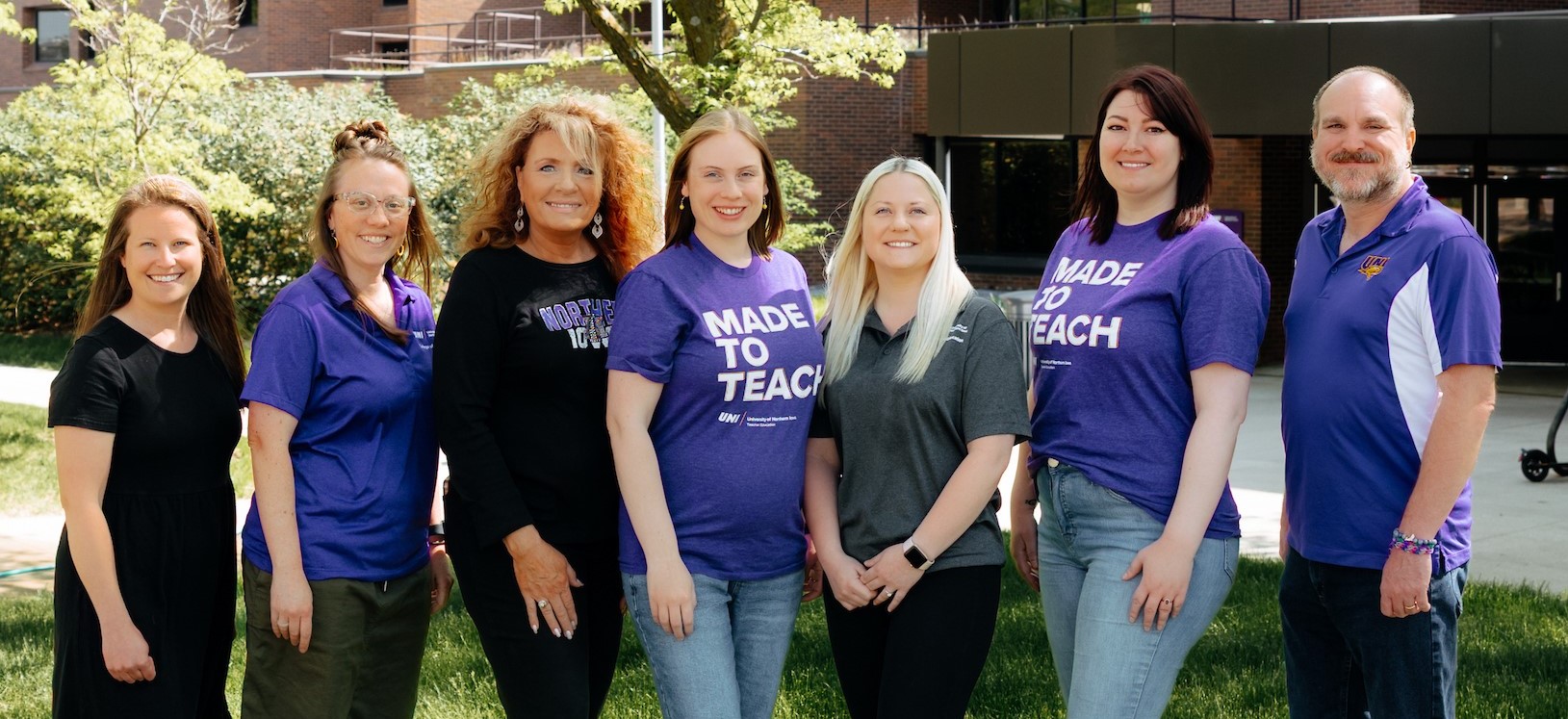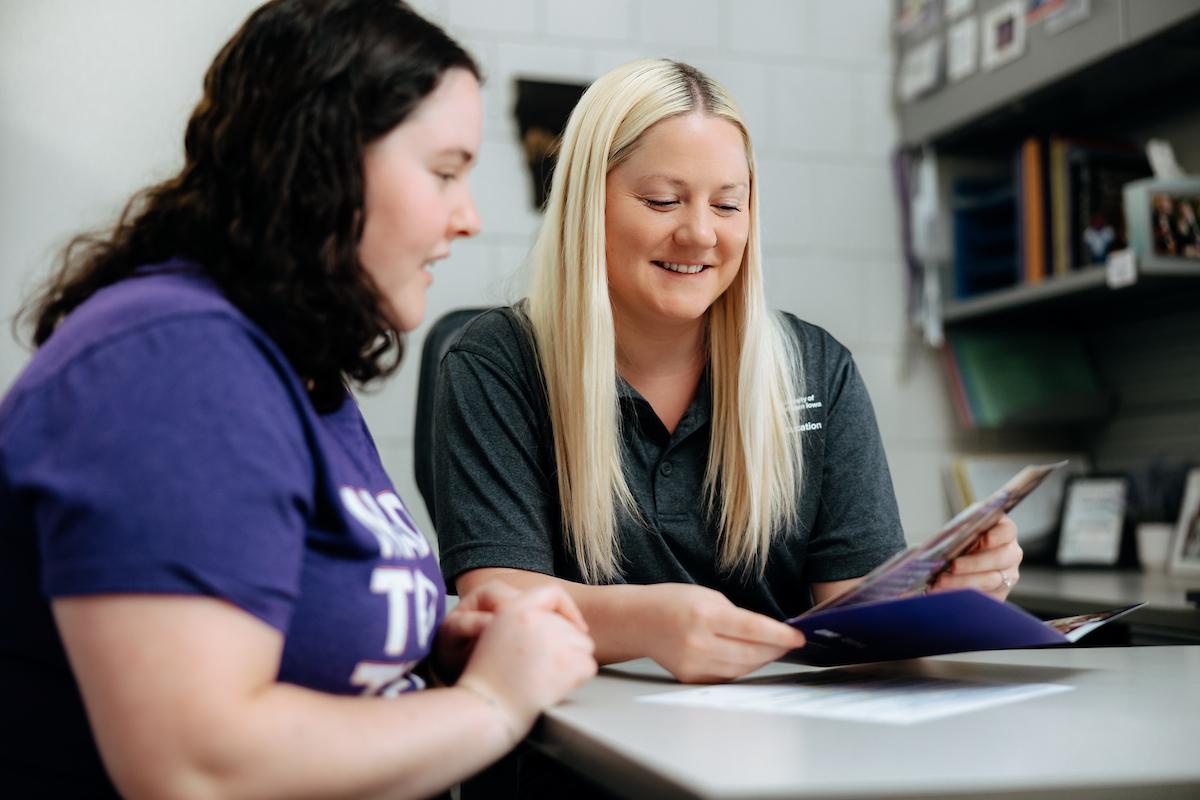CATS: Forever Looking Forward
Since the opening of the newly merged College of Education Advising and Teacher Education Success (CATS) Office three years ago, one goal has remained steadfast for its team: ensuring the best possible experience for the students they serve by continually improving what they do.
The office uses its shared resources to support two overlapping sets of students:
- College of Education (COE) undergraduates in teaching and recreation, tourism and nonprofit leadership, who benefit from advising services to support successful journeys through college as they prepare for rewarding careers
- UNI Teacher Education students (about 66% of whom are COE teaching majors) who receive a multitude of services to support their progression to licensure.
Jenny Connolly joined the team as director of COE advising in fall 2022 from the College of Business. Mandie Sanderman served as assistant dean of assessment and clinical experiences prior to her departure in July 2025. Together, they and their teams have steadily strengthened their support of student success.
A shared focus: teacher education

Many of the CATS Office initiatives naturally support teacher preparation.
Multiple efforts have focused on streamlining processes and creating helpful resources. For example, the teacher education admissions process has changed, with fewer requirements and a simplified application form. A shared Google Drive now offers helpful materials for professors, students and mentor teachers to assist with assessment, navigating the Anthology data management system and verifying background checks.
In response to new legislation that went into effect on July 1, 2024, the team developed eligibility requirements, an\ application and appeal process for students who may receive student teaching credit for working as substitute teachers or paraeducators. This opportunity to work part-time in the school system while still a student has proven to be a powerful, enriching experience.
“It gives our teacher candidates more confidence walking into a full-time job because they’ve been part of a school system aside from their student teaching,” Connolly says.
A new recognition initiative called Excellence in Education encourages UNI faculty and school district mentor teachers to recognize pre-service teachers for demonstrating excellence beyond expectations for their current level of educational experience. Launched in fall 2024, the effort garnered 207 separate submissions in its first year, recognizing students just beginning their journeys to those completing student teaching.
“While our pre-service teacher candidates certainly don’t expect recognition for ‘going above and beyond,’ it is also appreciated by them when they realize that those extra efforts are noticed and appreciated,” Sanderman says.
Connolly’s advising team is focused on supporting students as a whole — whether they’re coming as high school or transfer students and whether on campus or online. A year ago, staff created Future Teacher Welcome, a mandatory teacher education orientation to build community as well as set expectations. New processes like student teaching checks and graduation checks ensure students’ paperwork and requirements are on track.
New curriculum impacts CATS, too
 This fall’s implementation of an updated curriculum has impacted CATS as well, as the advising team worked first with current — and then incoming — students, to understand new options and approaches and set up new plans of study.
This fall’s implementation of an updated curriculum has impacted CATS as well, as the advising team worked first with current — and then incoming — students, to understand new options and approaches and set up new plans of study.
Another outcome: assessment now includes greater emphasis on professional dispositions, or durable employment skills – ’soft skills’ which local teachers and administrators say weighs heavily on teacher success. Evaluations now better reflect these skills as well as skill in content knowledge and pedagogy.
Handling the operational aspects of clinical experiences is a major role for the teacher education side of the office. That group is responsible for securing agreements with school districts and finding mentor teachers for the more than 2,500 placements annually they manage throughout the Cedar Valley and well beyond.
Moving to two clinical internships in place of three required field experiences before student teaching has led to a reassessment of placement assignments — and strengthened relationships with area schools. As a result of feedback gained this past spring during meetings with partner schools, CATS is now changing its recruitment process for mentor teachers and working to streamline communication between building administration and UNI faculty and CATS placement staff.
Getting to the goal line
With change an ongoing part of the educational landscape, the various members of the CATS team are ready to adapt. A number of the professional advising team also hold teaching degrees, including Connolly. They also bring strong expertise in student advising and placement gained from degrees and experience.
Step by step, they believe they’re making a difference in the student experience. That includes contributing to smoother, timely completion of degrees. And, taking into account that experience is also about connections and community in addition to policies and processes.
“We’re hoping to partner more with what our student organizations are doing and challenge students to go to community and campus events,” Connolly says. “How do you get outside your comfort zone? We want them to have a bigger network of humans. We want to encourage them to try new things, meet new people and go on the adventure.”
